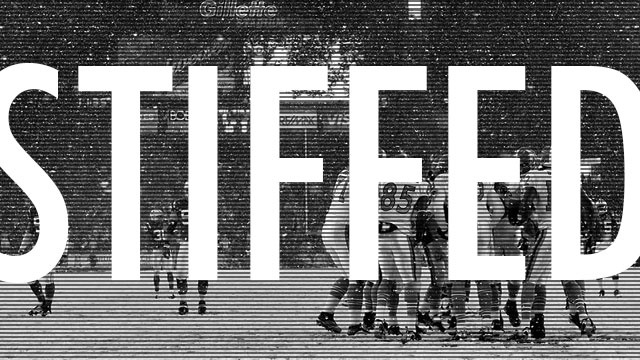Editor’s note: Got a betting tale you’re willing to share? We’d love to hear it. Email us at info@bettingtalk.com.
Because single-game sports betting is legalized in only one of 50 US states, Nevada, the majority of bettors are forced to do business with local bookies, where a man’s word—rather than a regulatory body—determines when or if someone gets paid.
When dealing with bookies, stiffs happen. Bettors stiff bookies and bookies stiff bettors.
Here are two such stories.
* * *
THE UNRELIABLE BOOKIE
In 2009, Ryan entered his senior year at the University of Delaware on a sports betting cold streak. He had been betting with a father/son operation for 15 months and lost between $12,000 and $14,000.
The son was a college student in Michigan and ran the day-to-day operations. The father was a surgeon in Maryland.
Ryan described himself as a good client, always paying up on his losses while at the same time pursuing the big score. His moment came in the third week of October.

The New England Patriots’ 59-0 beatdown of the Tennessee Titans capped off nine straight winning bets for Ryan, and also completed a series of mix-and-match parlays that left his account with a balance of $42,000.
He quickly called the bookie.
“I knew it immediately. It was a big hit. He was a college kid like me. He wasn’t going to have $42,000 in cash to pay me,” said Ryan, during a recent phone interview. “I told him to give me a chunk, pay the rest off in installments and I’ll continue to bet on the credit. I would have probably lost it all back.”
Ryan stayed in contact with the bookie and was promised to be paid over time. But by January—more than two months later—the communication ended and Ryan’s number was blocked. Apparently, it was the bookie’s only way of stopping the calls.
Ryan decided to visit the father’s Maryland residence, a mansion located off the TPC Potomac at Avenel Farm. Ryan knocked on the door for a couple hours with no response.
“I really just wanted to get the money back that I had paid them,” Ryan said.
Desperate, he decided to visit the father face-to-face at his Maryland medical office, waiting alongside 15 patients. The doctor came out, saw Ryan sitting there and told his receptionist that he’d deal with the situation after work.
Ryan sat around for three hours.
When the two finally met, the doctor threatened to call the police on Ryan for trespassing.
“I probably should have stayed and called their bluff and waited for the cops to come,” Ryan said. “I would have presented them with the checks and wire transfer documents I had in my possession to accounts with the doctor’s name as a joint owner. Hindsight is always 20/20.”
Ryan never got a cent from the bookie. He says he finally gave up trying after about 18 months—when he graduated and found a job.
“My advice is to diversify your outs,” Ryan said. “Forty-thousand-dollars is a lot for one bookie to handle, but $10,000 spread out to four shops, for example, may give you a better chance of getting paid.”
* * *
ROLE REVERSAL: BETTORS STIFF BOOKIE
Jack was well-schooled in the world of parlay cards and was the perfect candidate to take over his new fraternity’s sportsbook when he arrived at the University of Pittsburgh in the early 2000s.
The book started small, with college kids betting $50 or $100 on a few games. Jack teamed with another campus bookie and the business grew. He estimates booking roughly $50,000 during a football season.
Jack would settle up every two weeks if a bettor was up or down a minimum of $500. Most of his clients were either in the fraternity or lived on campus. He rarely had trouble collecting.
That changed when one of the frat brothers vouched for a pair of childhood friends from back home.
“I don’t think they were very experienced betting,” Jack said. “They got down quickly and started betting two-dollar (-200) baseball favorites. It caught up to them.”
When Jack scheduled a settle-up meeting, the bettors asked for and were granted a one-week extension. Meanwhile, they continued to bet and lose and soon found themselves down $1,000.
And the phone calls to Jack stopped.
“For me at the time, a college kid, $1,000 was a significant amount,” Jack said. “They wouldn’t return my calls or texts. I couldn’t really threaten anyone. What else could I do? They were young pricks, so I said, ‘(screw) it,’ I’ll call their parents.”
Jack dialed. A mom answered.
She was in utter disbelief.
“Listen, I don’t know if you’re aware of this, but your son owes me $1,000 for a gambling debt,” he told the mom. “My name is Jack. Your son was referred to me. I’ve been taking his bets for this long. He got down this much. He said he was going to pay me and didn’t.”
After some swearing, the mom eventually calmed down and hung up. A week later, the bettor cursed at Jack for calling his parents and eventually came up with a portion of what he owed.
He never paid his entire debt.
Jack got stiffed.
Years later, Jack is out of the bookie business and says getting stiffed was a big reason why. Asked during a recent phone interview if he felt bad for calling his former client’s parents, Jack offered an emphatic “no.”
“When you bet someone, you’re binding someone in an agreement,” he said. “And you’re only as good as your word, in my opinion.”
